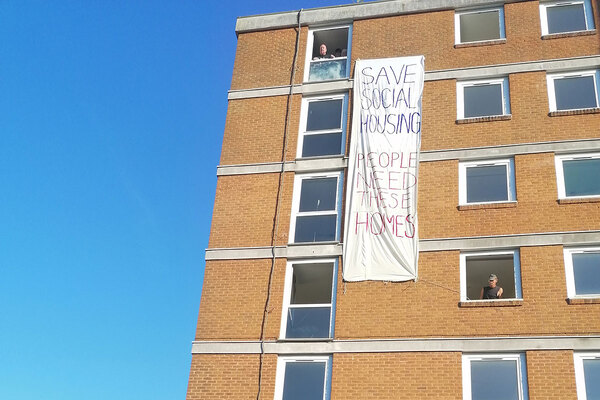You are viewing 1 of your 1 free articles
Orbit sees surplus hit by reduced sales and interest costs as it ups spending on damp and mould work
Orbit Group’s surplus has been dented by lower property sales and higher interest costs, at the same time as it ramped up spending to improve its handling of damp and mould after an independent review.
The social landlord’s overall surplus fell by 39% to £54.9m in the year that ended on 31 March 2024.
The reduction in property sales was “split broadly evenly” between shared ownership and market sales, which were £22m and £24m lower, respectively.
Interest costs increased by £5.1m during the period, reaching £54.6m, as a result of an increase in drawn debt of £92m to fund Orbit’s development and capital programmes.
It delivered 870 properties and invested £232.2m in developing new homes.
The impact of an ombudsman-ordered review into Orbit’s approach to damp and mould was clear, with operating costs experiencing “significant pressure” in 2023-24 as spending on repairs and maintenance rose by £11.2m to £57.7m.
This figure includes spending on day-to-day repairs; damp, mould and condensation problems flagged by customers; void repairs; property improvements; and building safety costs, the housing association said.
Management and administration expenditure was £10m higher year-on-year. Orbit said this was due to complaint-handling, legal and decant costs, compensation payments for disrepair claims and gaining access to properties, and annual salary increases.
The Housing Ombudsman ordered Orbit to review how it responds to requests for damp and mould repairs last October after it found “repeated” poor performance in this area.
The review was independent of both the ombudsman and the housing association, and was the first time the ombudsman had used this new power, granted under the Social Housing (Regulation) Act.
It resulted in 15 recommendations for the landlord.
“For Orbit, the determinations we received this year from the Housing Ombudsman identified gaps in our services and the need for real improvement. Put simply, in these cases we fell short of providing the homes and services our customers should rightly expect,” David Weaver, group chair of Orbit, said in the landlord’s annual report.
“We are already doing things differently. A robust assurance programme was developed to address the service gaps identified and is progressing well, with some changes having already been fully implemented and others being delivered as part of longer-term improvement plans.”
Phil Andrew, chief executive of Orbit Group, said the landlord continues to make progress “with a sharpened operational focus that is resolute in delivering our services and homes through the lens of our customers”.
“We have a lot to do. But with the combination of committed colleagues who have a passionate belief in our purpose, a clear vision and strategy, and a strong and resilient financial plan, we are well placed for success,” he said.
In May, Mr Andrew told Inside Housing that customers need to be “at the heart of everything we do”.
Overall, Orbit reported a lower group turnover of £391m, compared with £418m in full-year 2023, due to “a reduction in sales of properties, partially offset by higher income from social housing rents”.
The 46,500-home housing association also said it had seen its social rent income rise by 8.2% to £276m.
The increase reflected the annual rent settlement, improved voids management and new affordable and social rent properties coming into management.
Its operating surplus excluding fixed asset sales reached £88.7m on account of extra investment in repairs and maintenance, compared to £105.1m during the previous period.
Orbit’s operating margin was 22.7%, down slightly from last year’s 25.1%, which it said was due to inflationary cost pressures, increased levels of investment in homes and “slightly reduced property sales margins reflecting the rising cost to build”.
Orbit managed to increase its revenue reserves by £50m to £961m.
Jonathan Wallbank, group finance director, said: “In this challenging economic environment our financial delivery has remained solid.
“Our net assets have increased as a result of investment in our existing homes and through new social and shared ownership homes being built. Revenue reserves remain strong, and we continue to be financially well placed with a strong financial liquidity position.”
Investment in existing homes rose by 34.4% to £119.4m, with 85.6% of Orbit’s properties now at Energy Performance Certificate Band C or above.
Orbit said it had completed energy efficiency upgrades on 141 properties in the West Midlands through Wave 1 of the Social Housing Decarbonisation Fund (SHDF), while work had started to upgrade another 212 properties under SHDF Wave 2.1.
Last November, it secured a £115m sustainability-linked loan from Barclays to fund new housebuilding and improvements to the energy efficiency of its existing housing stock.
Sign up for our development and finance newsletter
Already have an account? Click here to manage your newsletters












